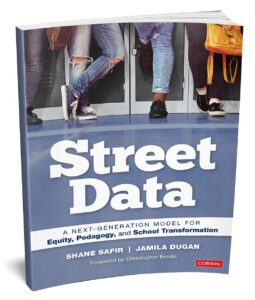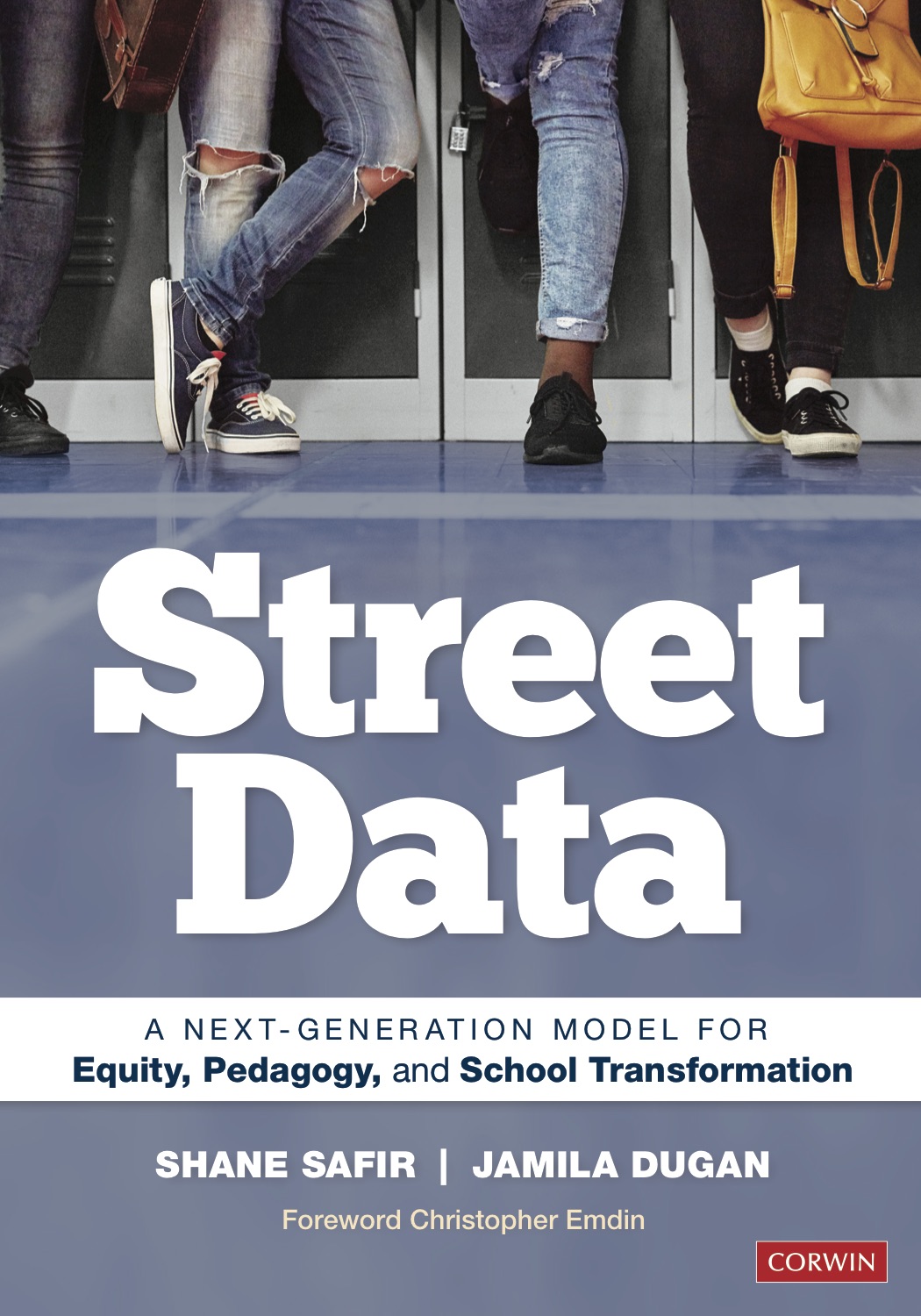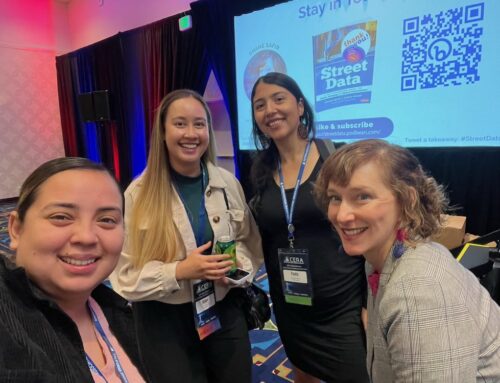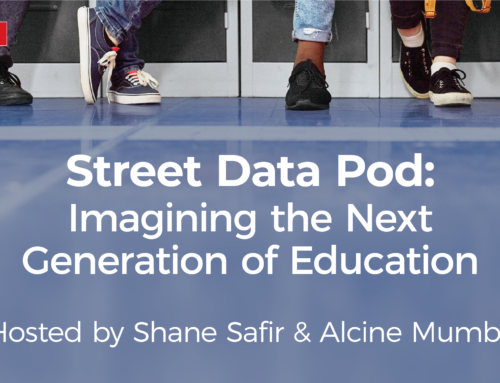Greetings, community!
Happy New Year. These days, I am filled with cautious hope as I think about what we all survived last year and what lies ahead. It was a difficult year for my family, as I know it was for many of yours, and I am sending you so much love, grace, and healing as we begin 2021.
I am especially hopeful and excited about the March 2nd drop of my second book, written with my professional sister Dr. Jamila Dugan and published by Corwin Press. I’ve included below an excerpt of the prologue so that you get a flavor of what this project is about and the impact we hope it will have. We can’t wait to share this book with you and hear your reactions.
With deep respect and regard,
Shane
P.S. Check out this YouTube video where Jamila and I reflect on our hopes for the book!
P.P.S. You can pre-order your copy of Street Data today and enjoy 20% off with the promo code SAFIR20.
***
Prologue: Street Data: A Next-Generation Model for Equity, Pedagogy, and School Transformation (Corwin, 2021)
As I write this book, we are steeped in a quadruple pandemic: COVID-19, systemic racism, near-economic collapse, and shattering climate change. COVID-19 has exploded onto the international stage, forever transforming our educational systems. Teachers are “ramping up” to digital or hybrid learning models. Administrators have repurposed school buildings into food banks and materials distribution centers. At the end of 2019-2020 school year, states canceled standardized testing for the academic year, and many universities have canceled entrance testing requirements for current applicants. Parents with means are hiring teachers to facilitate home schooling pandemic “pods” for their children, further exacerbating longstanding gaps.
At the same time, the unemployment rate is at a historic high. Police brutality and white supremacy reveal themselves daily as Black Americans fight for the right to breathe, live, and thrive in a country built on systemic racism. Activists in the growing movement for racial justice are tearing down monuments to Confederate soldiers, architects of Native American genocide and Canadian residential schools, and other symbols of oppression. And the globe reverberates with the invocation that Black Lives Matter in a country where, according to 1619 project director and journalist Nikole Hannah-Jones, “Black Americans have also been, and continue to be, foundational to the idea of American freedom. More than any other group in this country’s history, we have served, generation after generation, in an overlooked but vital role: It is we who have been the perfecters of this democracy” (Hannah-Jones, 2019).
While many clamor for a “return to normal,” the voices of educators across the globe are converging around a demand for a new normal: What would it look like to let go of all of our assumptions and rebuild the system from the bottom up, from the student up?
My co-author, Jamila Dugan and I propose a next-generation model of equity and deep learning, emerging from a simple concept: street data. Street data is the qualitative and experiential data that emerges at eye level and on lower frequencies when we train our brains to discern it. Street data is asset based, building on the tenets of culturally responsive education by helping educators look for what’s right in our students, schools, and communities instead of seeking out what’s wrong. Street data embodies both an ethos and a change methodology that will transform how we analyze, diagnose, and assess everything from student learning to district improvement to policy. It offers us a new way to think about, gather, and make meaning of data. It calls for what Paolo Freire deemed a pedagogy of liberation (Freire, 1970).
Even as the system seems to fall apart around us, street-level data are ubiquitous, offering deep insight into student and educator experience. These data fill our hearts and keep us up at night as we witness children’s resilience and struggle to stay engaged, socially connected, and emotionally well. These data fill our social media feeds and virtual meetings as we see relevant, just-in-time, professional learning, teachers calling their students one-by-one to ask, “How are you? What do you need?” and pedagogical thought leaders pushing us to move beyond the packet and engage students in deep learning. All of this manifests the creativity, care, and connection that exist and persist inside the system.
If we listen to policy wavelengths, the system is falling apart without its usual architecture. But if we listen to educators on the ground, the system is self-correcting and humanizing itself in a yearning for reinvention. Somehow, even though we are physically and socially distant, we are emerging into new webs of interdependence like never before. It is 2020. The world order is reorganizing itself and along with it, our education systems are as well. All of this takes me back over twenty years to when I began my teaching career.
I entered the classroom in fall 1997 with a vision of teaching and learning that burst at the seams of my classroom. But just a few years later, No Child Left Behind became federal law. With this sweeping policy shift came an eroding sense of possibility—a focus on narrow metrics of success and compliance-driven forms of pedagogy. Drill and kill your students so they succeed on the tests. Adopt pacing guides to ensure teachers stay “on track.” If you can’t trust your teachers, script the curriculum!
By the time I became a principal in 2003, the tide had turned, and our little public school, June Jordan School for Equity (JJSE), became a counter-cultural symbol and, in many ways, a pariah in the district. We were developing discussion-based seminar courses and project exhibitions while school districts began to compete for the best pacing guides, packaged curricula, and “turnaround” strategies. We were shaping a performance-based assessment system while principals across the district monitored teachers for compliance with the Blackboard Configuration, or BBC: a teacher-proof lesson structure meant to be an equity panacea.
Yet for the nearly twenty-five years since I first entered a classroom in southeast San Francisco, many of us have held onto an image of what is possible when we reject the rules of a rigged system designed to trap children in poverty and Black and Brown children in a deficit narrative. We have retained a vision of what is possible when we build classrooms and schools and systems around students’ brilliance, cultural wealth, and intellectual potential rather than self-serving savior narratives that have us “fixing” and “filling” academic gaps.
My early teaching experiences left me with indelible lessons that I hope will bloom in this book:
- There are many ways of knowing and “succeeding” beyond those that dominate American and much of Western education.
- Learning does not require a school building or even a classroom.
- Equity work is first and foremost pedagogical. We must democratize knowledge and rebuild a pedagogy of student voice.
- Student agency is the goal, not test scores.
- Data lives everywhere—on the streets, in students’ homes, in the hallways, in virtual meetings, in phone calls, and in the micro-interactions among teachers and students.
What is the purpose of education anyway? Do we teach and lead to simply reproduce reality, or will we teach and lead to transform it? In our new book Street Data: A Next Generation Model for Equity, Pedagogy, and School Transformation, we probe these questions in greater depth.
We hope to offer you a vision of an educational system that doesn’t yet exist—one rooted in human experience and decolonized ways of being, knowing, and learning. We will explore questions of knowledge and epistemology, digging up the roots of the obsession with quantitative data. We will explore questions of teaching and learning, giving you concrete tools to shape an equity-centered instructional vision and a pedagogy of student voice. We will explore questions of adult culture, offering a framework for the types of daily courageous conversations that make antiracist rhetoric real. And we will unpack the principles, processes, and practices of the next-generation paradigm we call street data.
We look forward to taking this journey with you and invite you to step forward with clear eyes, a full heart, and a spirit of inquiry and curiosity.
***
On My Nightstand
I did a lot of reading over break. A few of my favorites include:




A Tale for the Time Being by Ruth Ozeki is just brilliant. The teenage protagonist, Nao, bursts off the page with voice, life, heartache, and humor. Raising a teenager through this pandemic, I connected with Nao on multiple levels as well as with the semi-autobiographical character of Ruth. Highly recommend!
Brit Bennett’s second novel (before she is 35!), is a beautifully rendered, complex portrait of race and racism in the second half of 20th century America. Harkening back to Nella Larsen’s Passing from the Harlem Renaissance, which I read in undergrad, The Vanishing Half tells the story of twin sisters growing up in the rural South and then parting ways as one twin assumes a white identity and moves West while the other returns home to care for her mother and raise her daughter. I was especially moved by Bennett’s sensitive and non-sensationalistic portrait of a trans male character, Reese. A beautiful and moving book.
I have also begun reading The Body Is Not an Apology by the brilliant thinker/writer/poet Sonya Renee Taylor and Radical Acceptance by psychologist and Buddhist teacher Tara Brach. One frames a journey toward radical self-love, the other toward radical acceptance, and both are helping me explore identity, self, and parenting challenges in these trying times.
***
Key Dates
Thursday, February 4, 2021, 4:00-5:00 PM Pacific
Free Virtual Webinar! See flyer below for more details.
Antiracist Grading in a Pandemic: Dismantling Toxic Practices in 2021
Register here.
Wednesday, March 3, 2021, 10:30 AM Pacific
Keynote by Shane Safir
Spring Virtual Leadership Summit, New Tech Network
More info/register here.
Monday, May 3, 2021, 3:30 PM Pacific
Free Webinar presented by Corwin
Street Data: A Next-Generation Model for Equity, Pedagogy, and School Transformation
Featuring: Shane Safir, Dr. Jamila Dugan, and Chris Emdin
More info/register here.

 Enter your email here and get a free copy of the first chapter of Street Data!
Enter your email here and get a free copy of the first chapter of Street Data!






Leave A Comment
You must be logged in to post a comment.